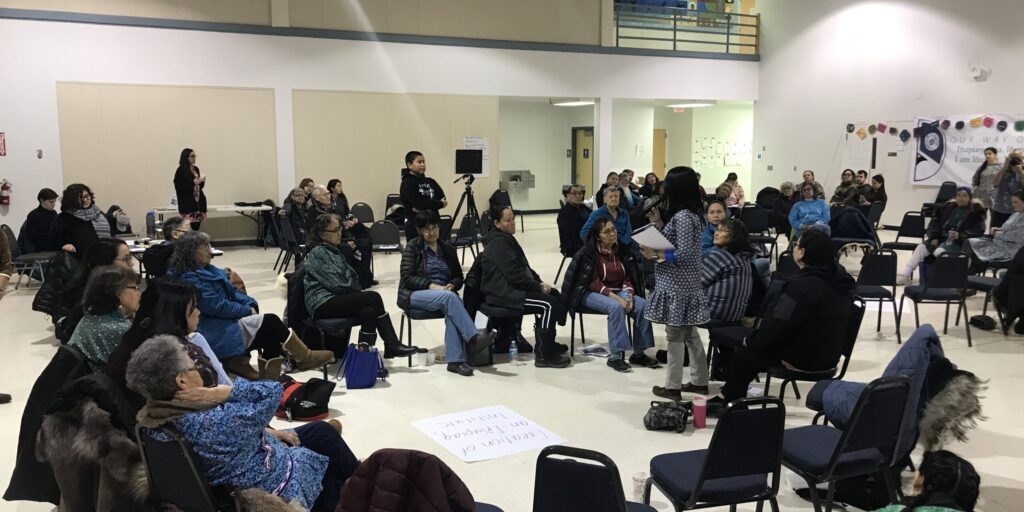The 2020 Census is not the only counting effort in Western Alaska this year. Debuting in the beginning of February, a comprehensive language survey of Iñupiat will project speaker counts and gauge attitudes of Alaska’s Iñupiaq community.
KNOM’s JoJo Phillips reports on the importance of the survey as well as the coalition behind it.
In April of 2018, the Alaska Native Language Revitalization Institute (ANLRI) recognized a need for a language survey across Alaska. With that goal in mind, the KI Coalition (short for Kipiġniuqtit Iñupiuraallanikun) was formed.
Qiġñaaq Cordelia Kellie, who sits on the Coalition’s board, describes where “KI” comes from.
“We were having discussions about what we could call ourselves. Our elders said Kipiġniuqtit means ‘we are passionate’ and Iñupiuraallanikun is like ‘through our language.’ Together, it means we are passionate about speaking our language, and that’s what the name means.”
As a name, “KI” functions on multiple levels. In colloquial Iñupiaq, “Ki” is often translated as a call to action, in the vein of “Let’s go!” Kellie says the Coalition functions as a “connective tissue” and platform for Iñupiaq speakers and allies across the state to communicate with one another. She points to last year’s KI Summit, held in Kotzebue, as an important step in identifying needs for the community.
“It was through these three-day discussions—this three-day summit—that the need for a language survey was identified.”
The survey was developed by Dr. Edna Maclean, a member of the North Slope Borough’s Inupiaq History, Language, and Culture Commission. It includes a number of specific questions to gauge the participant’s attitudes towards the language as well as their degree of fluency.
Iyaġak Myles Creed, a member of the KI Coalition, is completing a PhD in linguistics at the University of Victoria. On a recent conference call, he explained why such specifics are valuable.
“We do have a number of semi-fluent speakers—a good amount of ‘language learners’—and that can give us a larger breadth of knowledge about how many people are learning, how many people are speaking.”
Other questions on the survey focus on where the language is used and how often. While Kellie stresses the importance of having accurate speaker counts, she says the depth of the survey is what the KI Coalition is most excited about.
“It’s important to get qualitative data because then you’re starting to understand the nature and the relationship and the ways that Iñupiaq is showing up in people’s lives today. And you’re also gleaning some understanding of the attitudes people have about language. To be able to get that assessment is really important because another area that’s been identified from our 2019 Summit was the need for a language plan.”
To ensure that the Coalition has an accurate understanding of the region, Kellie and her team plan to spend the first 120 days of the survey using social media to advertise. Then the team will meet and identify gaps in their data, such as Alaska Native villages that might not have access to reliable internet. Kellie is open to going door-to-door if she has to, but is also planning on relying on regional organizations and their support.
“At that point we will likely be depending on local organizations… for example we would likely look to a regional partner to in turn take the paper copy and send it out to their contacts at local tribes. That would take some institutional or organizational support.”
The survey is currently available on the KI Coalition’s website, where you can also find their proclamation of 2020 as the “Year of Inupiaq Language.”
On the conference call, Creed spoke on how the proclamation reflected the Coalition’s growing excitement and their determination to revitalize their language. He cited acclaimed language activist Dr. Loreena Williams, saying, “we don’t know where to go if we don’t know where we are right now.”
The very name of the Coalition itself suggests they are on their way to finding that path.
Image at top: A spearker at the KI Summit. Photo courtesy of Cordelia Qiġñaaq Kellie, KI Coalition.




